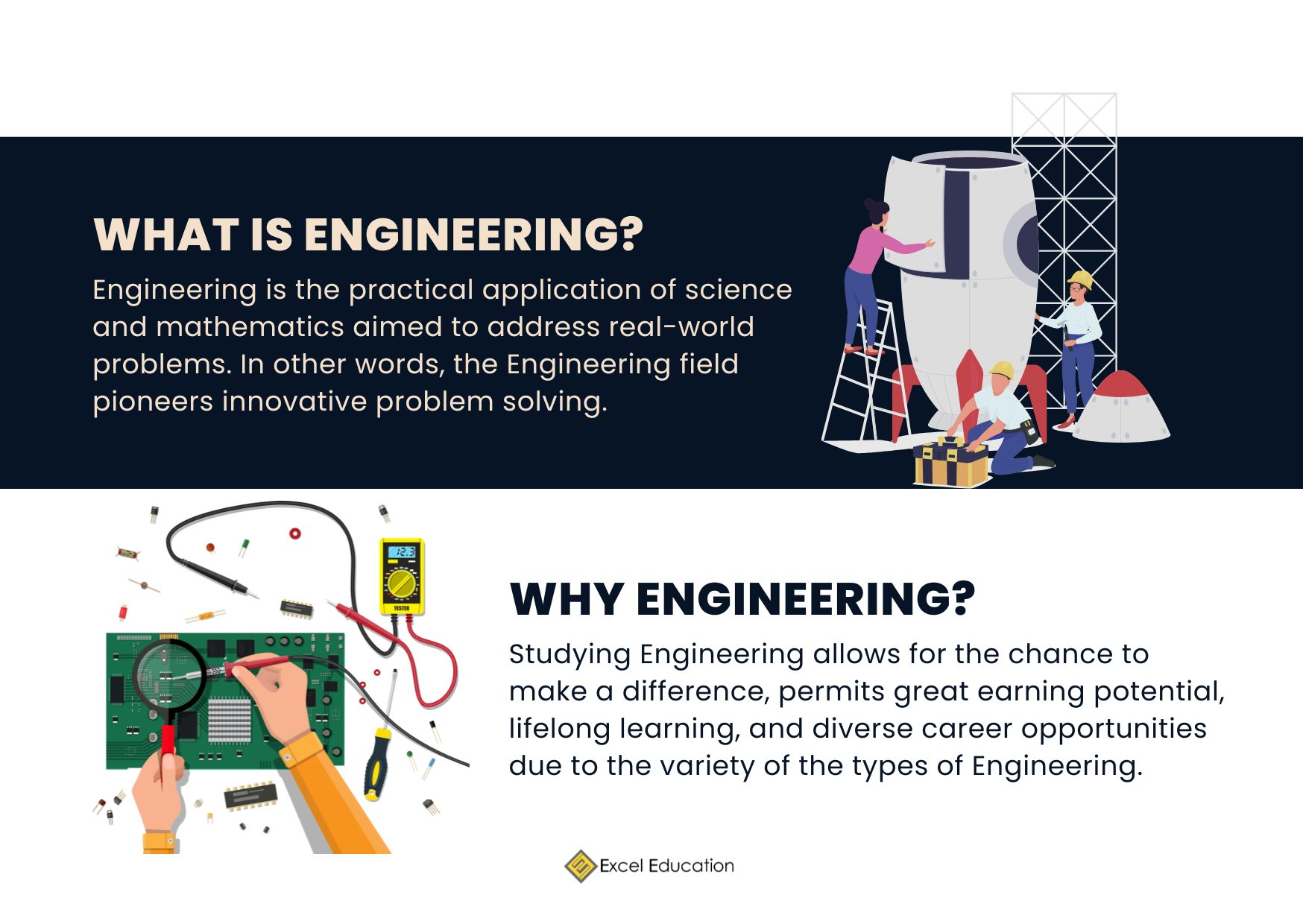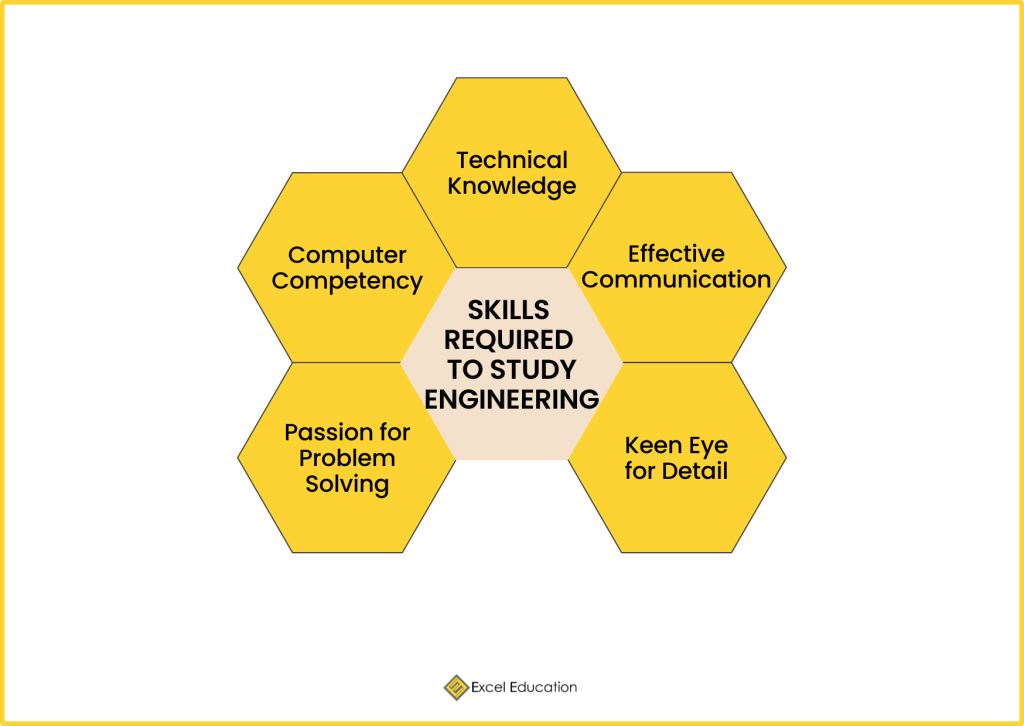
Society’s greatest challenges are almost always solved with the hands of Engineers – that’s why Engineering is a field crucial for the improvement of our lives. Australia projects a growing demand for Engineers in its labour market. So, let’s look at notions of Engineering along with engineering degree to study in Australia and recommended universities for Engineering in Australia!
Introduction of Engineering

Engineering is the practical application of science and mathematics aimed to address real-world problems. In other words, Engineering pioneers innovative problem solving. Engineering is responsible for the functionality of almost everything you see around you.
Engineers design, manufacture, build, assemble, and test various creations ranging from planes, smartphones, computing systems, even medicine, food, and cosmetics. Engineers can also be involved in sustaining safety regulations and budgeting finances.
Benefits for studying Engineering include the opportunity to make a difference in the world, great earning potential, lifelong learning, and diverse career opportunities due to the variety of the types of Engineering.
Types of Engineering

As society advances, Engineering follows suit as well. With this growth, it is no surprise there are over 20 types and subtypes of Engineering. That’s why, it is important to ask yourself questions about personal skills and interest before deciding on one type of Engineering. In this section, five types of Engineering degree in Australia will be looked at.
- Mechanical Engineering
One of the primary branches of Engineering is Mechanical Engineering. In fact, it is one of the broadest Engineering disciplines. Mechanical Engineering looks at the design, construction, operation, and testing of mechanical systems and machines. Mechanical Engineering can lead you in diverse areas of expertise including in manufacturing, aerospace, robotics, or hardware Engineering.
- Electrical Engineering
Electricity is a basic infrastructure integral in society, making Electrical Engineering essential in everyday lives. Electrical Engineers specialise in the design and testing of electronic resources like computers, motors, and navigation systems. Tasks of the field could range from creating microchips or generators to power cities.
- Civil Engineering
Civil Engineering is one of the oldest forms of Engineering. It centres on the design, construction, and maintenance of human-made structures, such as highways, bridges, tunnels, buildings, or water treatment facilities. Civil Engineering graduates can enter various professional fields including construction and infrastructure management, consulting, and public works.
- Computer Engineering
Computer Engineering is a type of Engineering which combines Computer Science and Electrical Engineering. It focuses on the design, analysis, and manufacturing of electronic circuits and devices. Computer Engineering graduates can work as computer programmers or analysts in fields such as information technology or Software Engineering.
- Chemical Engineering
Chemical Engineering integrates principles from diverse sciences like physics, chemistry, microbiology, and applied mathematics to create, transport, and effectively utilise chemicals, materials, and energy. Chemical Engineering finds application in various sectors such as the production of fibres for clothing, the formulation of soaps and detergents, the development of dyes, and the creation of food preservatives.
Skills Required to Study Engineering

- Technical Knowledge
Engineering projects can be complex with not much room for error, thus technical knowledge, especially the fundamentals and the concepts of your specialised field, is necessary in studying Engineering.
- Computer Competency
The rise of automation and digitisation in the Engineering field calls for a decent level of computer competency. Computing skills are becoming highly relevant and valued across most Engineering disciplines.
- Effective Communication
This skill is usually overlooked but is ultimately crucial when you collaborate in teams – which happens very often! This skill is also highly sought after by employers and needed when you have to communicate with team members who aren’t of an Engineering background.
- Passion for Problem Solving
The core of Engineering is arguably problem-solving. As such, a passion for problem-solving accompanied with analytical and critical thinking is definitely useful in studying Engineering.
- Keen Eye for Detail
Precision in small details, such as calculations for structural plans or troubleshooting codes, is crucial. Hence, a keen eye for detail is necessary to avoid errors in these cases when studying Engineering.
Career Opportunity upon Graduation
A career as an Engineer in Australia is reported to be in demand.
According to the Labour Market Insights by the Australian Government. Job projections for Engineering professions between the years 2022 to 2026 show that demand will increase most for:
- Telecommunications Engineering Professionals – 17.6% (3,100) more jobs
- Aircraft Maintenance Engineers – 16.7% (1,300) more jobs
- Surveyors and Spatial Scientists – 14.6% (2,100) more jobs
- Civil Engineering Professionals – 13.4% (8,700) more jobs
- ICT Business and Systems Analysts – 12.9% (5,900) more jobs
Career prospects and opportunities in Engineering vary depending on the type of Engineering you wish to specialise in. It is necessary to understand your personal interests or goals and consult before deciding on which Engineering specialisation to major in.
The average annual salary for an Engineer in Australia ranges between AU$95,000 to AU$115,000. This can vary depending on which region or city you plan to work in.
How to be an Engineer in Australia

So, how does one become an Engineer in Australia?
1. Complete SPM or equivalent examinations
You should complete your SPM or equivalent examinations while ensuring you pass the requirement into a pre-university or study programme that enables you into a Bachelor of Engineering in Australia.
2. Complete qualifying pre-university programme
After enrolling into a qualifying pre-university programme, you should make sure you pass the minimum requirements to ensure you are eligible to enter universities for Engineering in Australia
3. Complete an accredited Bachelor of Engineering programme
A four-year Bachelor of Engineering undergraduate programme is favourable in your journey as an Engineer. You also have the option to join a Diploma of Engineering for 8 to 12 months (depending on the type of programme and the institution it’s offered at) and gain entry into the second year of the Bachelor of Engineering undergraduate programme. At this step, it’s a good idea to decide on the type of Engineering you want to specialise in.
4. Join an industry association
Accredited undergraduate Engineering programmes usually permit its graduates to a professional membership of a particular body. For instance, most universities accredited by Engineers Australia allow students to apply for membership with the body for either under a Student Registration or a Graduate Registration.
5. Obtain additional credentials
After a four-year accredited Bachelor of Engineering programme, you would typically work as a Graduate Engineer for 2-3 years before being able to practise as a Professional Engineer. Regardless, certain Engineering specialisations call for postgraduate qualifications. There are other titles such as Chartered Professional Engineer (CPEng) or Registered Professional Engineer (RPEng) from Engineers Australia.
Most Engineering occupations are under the Medium and Long-term Strategic Skills List (MLTSSL). Engineering professions under MLTSSL have the opportunity for migration to Australia such as via the 494 subclass visa (Skilled Employer Sponsored Regional (provisional). Keep in mind there are other visa subclasses that you may apply for.
When you are eligible for permanent residency after, for instance, holding visa 494 for 3 years, you can then apply for permanent residency visa such as subclass 189 (Skilled Independent) or subclass 190 (Skilled Nominated). The choice of visa may vary from occupation, eligibility, regional preference, and wish to acquire permanent residence.
General entry requirements to enter universities for Engineering in Australia
Academic Entry
Do take note that most Engineering programmes have a Mathematics subject prerequisite. Depending on the Engineering specialisation, some would also require a Science subject prerequisite.
Academic Entry | Minimum Score |
STPM | CGPA 2.33 |
Matriculation | CGPA 2.90 |
A-Levels | Aggregate 7 (Best 3 Subjects i.e. CDD) |
UEC | GPA 2.20 |
IB Diploma | 25 |
Australian Matriculation (ATAR) | 80 |
Canadian Pre-University (CPU) | 70 |
Note: Universities may have different requirements. To learn more, get in touch with us!
English Language Entry Requirements
Entry Level | Minimum Score |
IELTS | 6.5 |
TOEFL | 79 |
Pearson Test of English (PTE) | 58 |
Note: Universities may have different requirements. To learn more, get in touch with us!
Top Universities for Engineering Courses in Australia
1. University of Sydney (USYD)

The University of Sydney, known as USYD, was founded in 1850. The University of Sydney was ranked 19th among universities globally in 2024 and is also a member of the Group of Eight (Go8) network, making it an internationally commendable study destination choice.
For the Engineering and Technology subject in 2024, the University of Sydney was awarded the third spot among all universities in Australia, fit for those wanting to pursue Engineering in Australia. Students will have access to cutting-edge Engineering technologies, hands-on learning experiences, Engineering student competitions, a number of Engineering clubs and societies, as well as various professional engagement activities.
Programme Offered | Bachelor of Engineering (Honours) Study Areas:
|
Duration | 4 Years |
Intake | February, July |
Indicative Fees (2024) | International Students: AU$224,000 |
Contact us right now for a free consultation if you’d like more details about the costs, the format of the programme, and the entry requirements!
2. University of Technology Sydney (UTS)

The University of Technology Sydney, abbreviated as UTS, is an acclaimed public higher education learning institution in Australia with history traced back to 1870. UTS is ranked among the top 100 of universities worldwide, marking their academic prominence and global impact.
In 2024, the University of Technology Sydney was ranked in the seventh place among Australian universities for the Engineering and Technology subject. UTS’ Engineering programmes offers industry-focused learning, work placements, community and case-based projects, overseas volunteering placements, on top of their reputation as an innovation precinct with modern teaching spaces and laboratories designed to inspire and support its students.
Programme Offered | Bachelor of Engineering (Honours) Major Options:
|
Duration | 4 Years |
Intake | February, July |
Indicative Fees (2024) | International Students: AU$216,612 |
Contact us right now for a free consultation if you’d like more details about the costs, the format of the programme, and the entry requirements!
3. University of Queensland (UQ)

The University of Queensland, commonly referred to as UQ, is a prominent public research university with its main counterpart in Brisbane. The University of Queensland was established in 1909 with unwavering academic dedication awarding the university in the top 50 among universities worldwide for the year of 2024.
Additionally, the University of Queensland is in the fifth spot among Australian universities for the Engineering and Technology subject in 2024, suited for those wanting to academically pursue Engineering in Australia. The Bachelor of Engineering (Honours) programme at UQ provides accredited comprehensive curriculum, work placements, overseas studies, with six core Engineering specialisations to choose based on your personal interests.
Programme Offered | Bachelor of Engineering (Honours) Specialisation Options:
|
Duration | 4 Years |
Intake | February, July |
Indicative Fees (2024) | International Students: AU$204,800 |
Contact us right now for a free consultation if you’d like more details about the costs, the format of the programme, and the entry requirements!
4. Queensland University of Technology (QUT)

Queensland University of Technology, rather QUT, is a notable public tertiary learning institution with history dating back to 1849. Queensland University of Technology has made its mark in academia, proven through its rank in the top 15 among universities in Australia for the year of 2024.
What’s more, the Queensland University of Technology is in the eleventh spot amongst universities in Australia for the Engineering and Technology subject in 2024. QUT’s Engineering programme accommodates prospective Engineering students with an accredited practical approach to learning, opportunities for industry projects, and numerous student Engineering clubs alongside access to latest technologies and equipment in QUT’s advanced Engineering facilities.
Programme Offered | Bachelor of Engineering (Honours) Major Options:
|
Duration | 4 Years |
Intake | February, July |
Indicative Fees (2024) | International Students: AU$169,600 |
Contact us right now for a free consultation if you’d like more details about the costs, the format of the programme, and the entry requirements!
5. Curtin University

Curtin University is a distinguished public research university which was inaugurated in 1966. Curtin University is a reputable study destination, noting their ranks in the top 15 among universities in Australia for the year 2024 as well as their globally recognised innovative courses and programmes.
For the Engineering and Technology subject in 2024, Curtin University is placed in the top 15 amongst Australian Universities. Prospective students benefit from accredited Engineering syllabuses, enviable suite of facilities, industry opportunities, comparatively affordable fee for quality education alongside the liberty of choosing from ten Engineering majors.
Programme Offered | Bachelor of Engineering (Honours) Major Options:
|
Duration | 4 Years |
Intake | February, July |
Indicative Fees (2024) | International Students: AU$150,029 |
Contact us right now for a free consultation if you’d like more details about the costs, the format of the programme, and the entry requirements!
For more information regarding the university, programme offered, entry requirements and fees, contact Excel Education.
About The Author

Hannah Hir
Hannah appreciates various art forms, especially Asian literature, film and music. Most of her favorite Malaysian kuihs are green-coloured.

